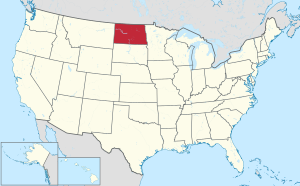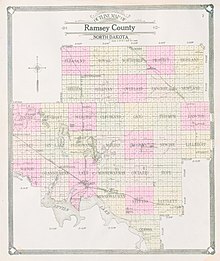Ramsey County, North Dakota
Ramsey County | |
|---|---|
 Ramsey County Courthouse in Devils Lake, North Dakota. | |
 Location within the U.S. state of North Dakota | |
 North Dakota's location within the U.S. | |
| Coordinates: 48°15′N 98°43′W / 48.25°N 98.72°W | |
| Country | |
| State | |
| Founded | January 4, 1873 (created) January 25, 1883 (organized) |
| Named for | Alexander Ramsey |
| Seat | Devils Lake |
| Largest city | Devils Lake |
| Area | |
• Total | 1,301 sq mi (3,370 km2) |
| • Land | 1,187 sq mi (3,070 km2) |
| • Water | 114 sq mi (300 km2) 8.8% |
| Population (2020) | |
• Total | 11,605 |
• Estimate (2023) | 11,463 |
| • Density | 8.9/sq mi (3.4/km2) |
| Time zone | UTC−6 (Central) |
| • Summer (DST) | UTC−5 (CDT) |
| Congressional district | At-large |
| Website | www |
Ramsey County is a county in the U.S. state of North Dakota. As of the 2020 census, the population was 11,605.[1] Its county seat is Devils Lake.[2]
History
The Dakota Territory legislature created the county on January 4, 1873, with areas partitioned from Pembina County. The county was named for Alexander Ramsey, a U.S. Senator from Minnesota and the first Minnesota Territorial Governor.[3] The county government was not completed at that time, and the county was not attached to another county for administrative or judicial purposes. This situation continued until January 25, 1883, when the county government was effected.
The county's boundaries were altered twice in March 1883, twice more in 1885, and again in 1890. Its present boundaries have remained unchanged since 1890.[4]

Geography
The southwest boundary of Ramsey County is defined by Devils Lake. The county terrain consists of rolling hills, dotted with lakes and ponds. The area is largely devoted to agriculture.[5] The terrain slopes to the lake, with its highest point at the NE county corner, at 1,631 ft (497 m) ASL.[6] The county has a total area of 1,301 square miles (3,370 km2), of which 1,187 square miles (3,070 km2) is land and 114 square miles (300 km2) (8.8%) is water.[7]

Major highways
Transit
Adjacent counties
- Cavalier County - north
- Walsh County - east
- Nelson County - southeast
- Benson County - southwest
- Towner County - northwest
National protected areas
Lakes[5]
- Chain Lake
- Creel Bay
- Dry Lake
- East Devils Lake
- Lake Alice
- Lake Irvine
- Mikes Lake
- Morrison Lake
- Sixmile Bay
- Sweetwate Lake
Demographics
| Census | Pop. | Note | %± |
|---|---|---|---|
| 1880 | 281 | — | |
| 1890 | 4,418 | 1,472.2% | |
| 1900 | 9,198 | 108.2% | |
| 1910 | 15,199 | 65.2% | |
| 1920 | 15,427 | 1.5% | |
| 1930 | 16,252 | 5.3% | |
| 1940 | 15,626 | −3.9% | |
| 1950 | 14,373 | −8.0% | |
| 1960 | 13,443 | −6.5% | |
| 1970 | 12,915 | −3.9% | |
| 1980 | 13,048 | 1.0% | |
| 1990 | 12,681 | −2.8% | |
| 2000 | 12,066 | −4.8% | |
| 2010 | 11,451 | −5.1% | |
| 2020 | 11,605 | 1.3% | |
| 2023 (est.) | 11,463 | [8] | −1.2% |
| U.S. Decennial Census[9] 1790-1960[10] 1900-1990[11] 1990-2000[12] 2010-2020[1] | |||
2020 census
As of the 2020 census, there were 11,605 people, 4,947 households, and 2,883 families in the county.[13] The population density was 9.8 inhabitants per square mile (3.8/km2) There were 5,843 housing units.
2010 census
As of the 2010 census, there were 11,451 people, 4,955 households, and 3,008 families in the county. The population density was 9.65 people per square mile (3.73 people/km2). There were 5,615 housing units at an average density of 4.73 units per square mile (1.83/km2). The racial makeup of the county was 87.7% white, 8.7% American Indian, 0.4% black or African American, 0.4% Asian, 0.2% from other races, and 2.6% from two or more races. Those of Hispanic or Latino origin made up 1.2% of the population. In terms of ancestry, 41.9% were German, 37.7% were Norwegian, 7.0% were Irish, 5.7% were Swedish, 5.2% were English, and 2.9% were American.
Of the 4,955 households, 27.5% had children under the age of 18 living with them, 47.0% were married couples living together, 9.5% had a female householder with no husband present, 39.3% were non-families, and 34.5% of all households were made up of individuals. The average household size was 2.21 and the average family size was 2.82. The median age was 43.0 years.
The median income for a household in the county was $41,792 and the median income for a family was $56,632. Males had a median income of $41,274 versus $25,171 for females. The per capita income for the county was $24,130. About 8.7% of families and 11.5% of the population were below the poverty line, including 16.7% of those under age 18 and 15.4% of those age 65 or over.
Population by decade

Communities
Cities
- Brocket
- Crary
- Devils Lake (county seat)
- Edmore
- Hampden
- Lawton
- Starkweather
Unincorporated communities[5]
Townships
- Bartlett
- Cato
- Chain Lakes
- Coulee
- Creel
- De Groat
- Dry Lake
- Fancher
- Freshwater
- Grand Harbor
- Hammer
- Harding
- Highland Center
- Hope
- Klingstrup
- Lawton
- Lillehoff
- Minnewaukan
- Morris
- Newbre
- Newland
- Noonan
- North Creel
- Northfield
- Odessa
- Ontario
- Overland
- Pelican
- Poplar Grove
- Prospect
- Royal
- South Minnewaukan
- Stevens
- Sullivan
- Triumph
- Webster
Politics
Ramsey County voters have traditionally voted Republican. In only two national elections since 1944 has the county selected the Democratic Party candidate (as of 2024).
| Year | Republican | Democratic | Third party(ies) | |||
|---|---|---|---|---|---|---|
| No. | % | No. | % | No. | % | |
| 2024 | 3,609 | 68.89% | 1,513 | 28.88% | 117 | 2.23% |
| 2020 | 3,577 | 66.59% | 1,639 | 30.51% | 156 | 2.90% |
| 2016 | 3,217 | 60.64% | 1,505 | 28.37% | 583 | 10.99% |
| 2012 | 2,665 | 53.31% | 2,164 | 43.29% | 170 | 3.40% |
| 2008 | 2,361 | 49.58% | 2,314 | 48.59% | 87 | 1.83% |
| 2004 | 2,943 | 60.06% | 1,885 | 38.47% | 72 | 1.47% |
| 2000 | 3,005 | 60.38% | 1,658 | 33.31% | 314 | 6.31% |
| 1996 | 2,077 | 43.51% | 2,123 | 44.47% | 574 | 12.02% |
| 1992 | 2,516 | 41.56% | 2,008 | 33.17% | 1,530 | 25.27% |
| 1988 | 3,103 | 53.12% | 2,665 | 45.63% | 73 | 1.25% |
| 1984 | 4,150 | 63.33% | 2,304 | 35.16% | 99 | 1.51% |
| 1980 | 4,078 | 64.88% | 1,607 | 25.57% | 600 | 9.55% |
| 1976 | 3,293 | 50.65% | 3,096 | 47.62% | 113 | 1.74% |
| 1972 | 3,954 | 61.78% | 2,384 | 37.25% | 62 | 0.97% |
| 1968 | 3,189 | 54.56% | 2,384 | 40.79% | 272 | 4.65% |
| 1964 | 2,409 | 40.24% | 3,572 | 59.66% | 6 | 0.10% |
| 1960 | 3,599 | 56.12% | 2,813 | 43.86% | 1 | 0.02% |
| 1956 | 3,821 | 64.44% | 2,103 | 35.46% | 6 | 0.10% |
| 1952 | 4,670 | 71.97% | 1,794 | 27.65% | 25 | 0.39% |
| 1948 | 2,891 | 52.04% | 2,458 | 44.25% | 206 | 3.71% |
| 1944 | 2,505 | 49.28% | 2,539 | 49.95% | 39 | 0.77% |
| 1940 | 3,629 | 50.44% | 3,530 | 49.07% | 35 | 0.49% |
| 1936 | 1,784 | 25.51% | 4,559 | 65.19% | 650 | 9.30% |
| 1932 | 1,917 | 30.29% | 4,337 | 68.53% | 75 | 1.19% |
| 1928 | 3,246 | 54.62% | 2,672 | 44.96% | 25 | 0.42% |
| 1924 | 3,110 | 62.35% | 359 | 7.20% | 1,519 | 30.45% |
| 1920 | 3,996 | 79.33% | 937 | 18.60% | 104 | 2.06% |
| 1916 | 1,169 | 44.91% | 1,331 | 51.13% | 103 | 3.96% |
| 1912 | 739 | 32.19% | 917 | 39.94% | 640 | 27.87% |
| 1908 | 1,480 | 55.79% | 1,072 | 40.41% | 101 | 3.81% |
| 1904 | 1,523 | 76.46% | 386 | 19.38% | 83 | 4.17% |
| 1900 | 1,147 | 67.79% | 496 | 29.31% | 49 | 2.90% |
Education
School districts include:[15]
- Dakota Prairie Public School District 1
- Devils Lake Public School District 1
- Edmore Public School District 2
- Lakota Public School District 66
- Leeds Public School District 6
- Minnewaukan Public School District 5
- North Star School District
- Starkweather Public School District 44
- Warwick Public School District 29
See also
References
- ^ a b "State & County QuickFacts". United States Census Bureau. Retrieved May 8, 2024.
- ^ "Find a County". National Association of Counties. Retrieved June 7, 2011.
- ^ "County History". Official Portal for North Dakota State Government. Archived from the original on February 2, 2015. Retrieved May 4, 2011.
- ^ "Dakota Territory, South Dakota, and North Dakota: Individual County Chronologies". Dakota Territory Atlas of Historical County Boundaries. The Newberry Library. 2006. Archived from the original on April 2, 2018. Retrieved February 4, 2015.
- ^ a b c "Ramsey County · North Dakota". Google Maps. Retrieved April 27, 2024.
- ^ "Find an Altitude/Ramsey County ND" Google Maps (accessed February 26, 2019)". Archived from the original on May 21, 2019. Retrieved February 26, 2019.
- ^ "2010 Census Gazetteer Files". United States Census Bureau. August 22, 2012. Archived from the original on January 29, 2015. Retrieved February 1, 2015.
- ^ "Annual Estimates of the Resident Population for Counties: April 1, 2020 to July 1, 2023". Retrieved May 8, 2024.
- ^ "U.S. Decennial Census". United States Census Bureau. Retrieved February 1, 2015.
- ^ "Historical Census Browser". University of Virginia Library. Retrieved February 1, 2015.
- ^ Forstall, Richard L., ed. (April 20, 1995). "Population of Counties by Decennial Census: 1900 to 1990". United States Census Bureau. Retrieved February 1, 2015.
- ^ "Census 2000 PHC-T-4. Ranking Tables for Counties: 1990 and 2000" (PDF). United States Census Bureau. April 2, 2001. Archived (PDF) from the original on March 27, 2010. Retrieved February 1, 2015.
- ^ "US Census Bureau, Table P16: Household Type". United States Census Bureau. Retrieved May 8, 2024.
- ^ Leip, David. "Atlas of US Presidential Elections". uselectionatlas.org. Retrieved April 13, 2018.
- ^ "2020 CENSUS - SCHOOL DISTRICT REFERENCE MAP: Ramsey County, ND" (PDF). U.S. Census Bureau. Retrieved June 14, 2024. - Text list
External links
- Ramsey County – Official Website
- Ramsey County maps, Sheet 1 (northern) and Sheet 2 (southern), North Dakota DOT

